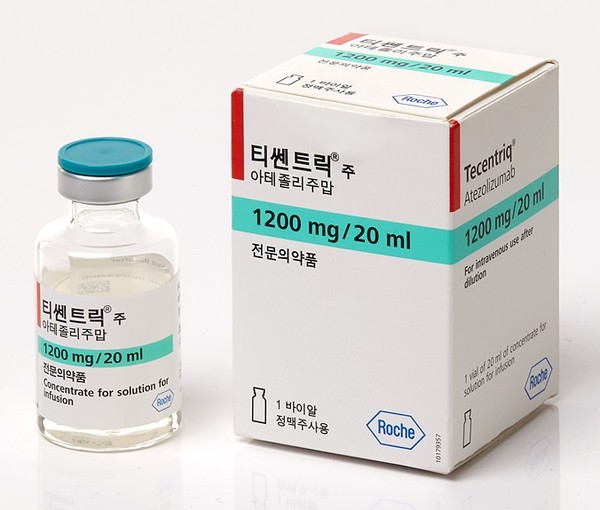Tecentriq (atezolizumab), an anti-PD-L1 drug developed by Roche, has become the first immunotherapy in Korea approved as a postoperative adjuvant treatment for early non-small cell lung cancer (NSCLC) patients.
Last Friday, the Ministry of Food and Drug Safety approved the use of Tecentriq as the “post-operative adjuvant therapy” for stage 2-3A NSCLC patients (according to the seventh edition of the Union for International Cancer Control-American Joint Committee on Cancer (UICC-AJCC)) with programmed death-ligand-1 (PD-L1) occurrence rate reaching 50 or more of tumor cells, after undergoing resection and platinum-based chemotherapy.

NSCLC accounts for 85-90 percent of lung cancer, the No. 1 cause of cancer death in Korea. In addition, a considerable number of patients are diagnosed in locally progressive or metastatic phases, and about of NSCLC patients who receive complete resection experience recurrence even after the operation.
The latest indication expansion was based on the interim result analysis of the phase 3 clinical trial, IMpower010 study.
According to its results, the administration of Tecentriq on phase 2-3A NSCLC patients with PD-L1 expression rate of 50 percent or more after undergoing complete resection and platinum-based chemotherapy, the recurrence or disease-free survival (DFS) risk fell by 57 percent compared to best supportive care (BSC).
Also, the Tecentriq adjuvant therapy group’s DFS benefit was consistently observed in most subgroups with different treatment records and disease phases. Although OS in patients with a PD-L1 expression rate of 50 percent or more has not reached the median value, the tiered risk ratio improved by remaining at 0.43.
The safety data were consistent with previously known safety profiles of Tecentriq monotherapy, and no new safety signs have been reported. Among all patients with the intention to treat (ITT), the most common adverse reactions in the Tecentriq group were alanine aminotransferase (ALT) rise (2 percent), pneumonia (1 percent), and aspartate aminotransferase (AST) rise (1 percent).
Based on this data, the U.S. National Comprehensive Cancer Network (NCCN) guideline recommends Tecentriq’s post-operative adjuvant therapy as Category 2A. In addition, the American Society for Clinical Oncology (ASCO) also recommends Tecentriq adjuvant therapy in its guideline for postoperative adjuvant therapy for early lung cance4r patients.
“About half of early NSCLC patients experience recurrence after an operation,” said Professor Kim Sang-ui of the Department of Oncology at Asan Medical Center. “Some patients with relapses are cases where treatments are impossible. We can reduce the recurrence rate by treating cancer in the early phase immediately after the operation.”
Kim, noting that immunotherapies have mainly been used to treat metastatic NSCLC, said that the latest approval would allow its for early-phase cancer patients, offering opportunities to reduce cancer recurrence rate after operation and chemotherapies for Korean NSCLC patients with high expression rate of PD-L1.
Lee Seung-hoon, who is in charge of the medical part at Roche Korea as the medical partnership cluster lead, said, “I am pleased to provide an immunotherapy-based treatment option for early NSCLC patients who have undergone complete resection and platinum-based chemotherapy after a decade.”
Lee added that Roche Korea would continue to try to provide innovative immunotherapy-based treatment options for lung cancer area, the No. 1 cause of cancer deaths.

